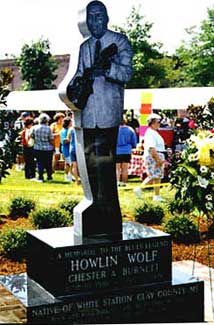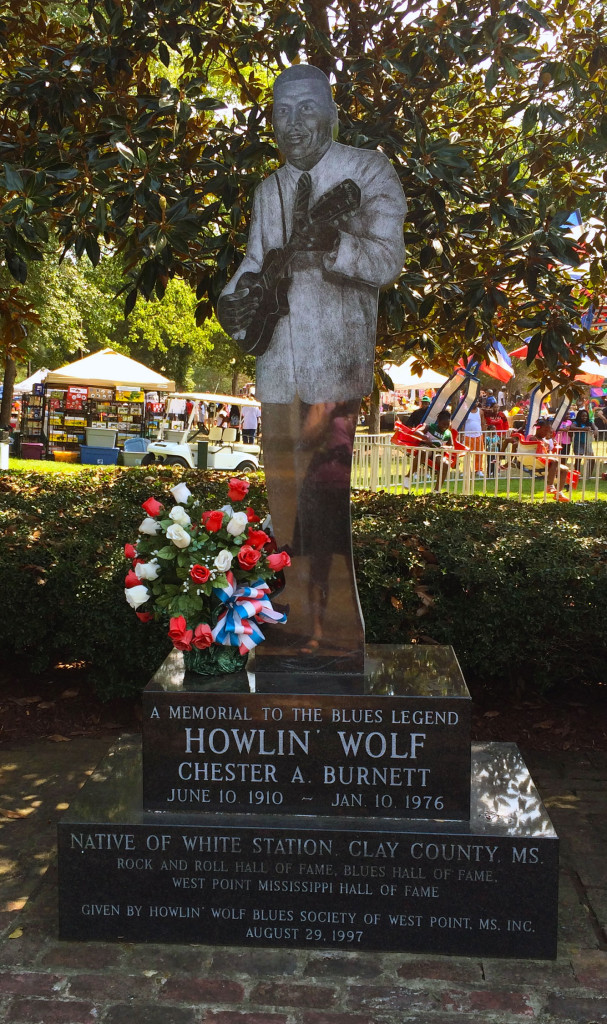Major Works
- The Real Folk Blues (recorded 1956-65, Chess 1966)
- Live and Cookin’ at Alice’s Restaurant (Chess)
- Big City Blues (United 1966)
- More Real Folk Blues (recorded 1953-57, Chess 1967)
- Evil (Chess)
- The London Howlin’ Wolf Sessions
- Howlin’ Wolf: Chess Blues (featuring Eric Clapton, Steve Winwood, and The Rolling Stones)
- Message to the Young (Chess 1971)
- The Legendary Sun
- The Back Door Wolf (Chess 1973)
- Change My Way (Chess 1977)
- Moanin’ in the Moonlight (recorded 1951-59, Chess reissue 1987)
- I’m the Wolf (Vogue)
- Cadillac Daddy (Memphis recordings 1952)
- Chicago: 26 Golden Years (Chess)
- From Early til Late (Blue Night)
- His Greatest Sides Volume 1 (Chess)
- Howlin’ Wolf: Moanin’ in the Moonlight (Chess)
- Going Back Home (British Import)
- Heart Like Railroad Steel: Rare and Unreleased
- Recordings Volume 1 (Blues Ball)
- Ridin’ in the Moonlight (Ace)
- Can’t Put Me Out: Rare and Unreleased
- Howlin’ Wolf (with Funny Papa)
- Recordings Volume 2 (Blues Ball)
Howlin’ Wolf: A Biography
by Dylan Hawkins (SHS)
Howlin’ Wolf, born Chester Arthur Burnett, was born in White Station, near West Point, Mississippi, on June 10, 1910. He was one of six children in his family. He, along with his brothers and sisters, was raised on a plantation where his parents worked (Contemporary Musicians 111). When Wolf was a child, his grandfather told him stories of wolves in Mississippi. Once, something frightened him and he ran howling upstairs, which prompted his family to nickname him Howlin’ Wolf. Wolf’s father presented him with his first guitar when he was eighteen. With the exception of the World War I years, during which Wolf served in the Army and was stationed at Seattle, Washington, he spent most of his adult life (until the age of 38) farming in Arkansas and Mississippi. It wasn’t until his father’s death in 1949 that he devoted himself entirely to the blues (Contemporary Musicians 113).
Throughout his young life Wolf had his pick of blues greats for mentors: Charlie Patton lived on a nearby plantation and taught Wolf much about showmanship. Sonny Boy Williamson married Wolf’s stepsister and showed Wolf the ins and outs of the harmonica during the courtship. Wolf himself was married briefly to Willie Brown’s sister. Wolf’s childhood idol was singer Jimmie Rodgers, who was noted for his “blues-yodel.” Wolf tried to emulate the yodel but found that his efforts sounded more like a growl or a howl. Wolf met legendary Delta blues singer Robert Johnson in Robinsonville, Mississippi, and they played together briefly. Shortly thereafter Johnson was poisoned by a jealous girlfriend or husband (Withers 59).
Wolf never read music. He would sit on a metal chair in the studio, wearing big horn-rimmed glasses, shirt open, cradling a beat-up guitar, playing according to what sounded right to him. Typically, Wolf had to demonstrate what he wanted and run through it until his back-up players understood through sheer instinct.
After nearly a quarter century of remarkable performances throughout the U.S. and abroad, Howlin’ Wolf died of complications arising from kidney disease on January 10, 1976, in a Chicago hospital; he was sixty-five. He had sung the blues almost until the time of his death despite his illness; his last public appearance was with renowned guitarist B.B. King at the Chicago Amphitheater in November of 1975.
UPDATE 2008: Howlin’ Wolf was posthumously inducted into the Blues Foundation’s Hall of Fame in 1980 and the Rock & Roll Hall of Fame in 1991. In 1995 he was inducted into the Hall of Fame in his hometown of West Point, Mississippi, and The Howlin’ Wolf Blues Society was formed in West Point in 1996, largely through the efforts of Dr. Joe Stephens. The first annual Howlin’ Wolf Blues Festival was held in West Point in 1996 and is now held every year in August just before the Prairie Arts Festival in West Point.
In 2001 Lillie Burnett, Howlin’ Wolf’s wife, known as the First Lady of Chicago Blues, died of congestive heart failure at the age of 75 in her Hazel Crest home.Two daughters Barbra Marks and Bettye Kelly survive their parents.
The Blues Hall of Fame has awarded Moanin’ at Midnight: The Life and Times of Howlin’ Wolf by James Segrest and Mark Hoffman a 2008 Classics of Blues Literature award. The well-researched biography describes the tribulations and rejections of Burnett’s childhood, his discharge from the army on psychiatric grounds, and recollections of Howlin’ Wolf by musicians from both the blues and rock ‘n’ roll worlds. The book was published in 2004.
Timeline
- 1910-Howlin’ Wolf was born in White Station, near West Point, Mississippi, on June 10.
- 1928-Wolf received his first guitar.
- 1930-Wolf married his first wife.
- 1930-1940-Wolf toured with Robert Johnson and Sonny Williamson.
- 1948-Wolf formed his own band in Memphis, Tennessee.
- 1949-When Wolf was 38, his father died. Great interest in Blues began.
- 1950-Wolf married his second wife Lillie
- 1951-Wolf released his first album on Chess Records.
- 1952-Wolf left his band and began touring in Europe.
- 1968-Wolf released The London Howlin’ Wolf Sessions.
- 1970-Wolf appeared on the cover of the first issue of Living Blues Magazine.
- 1971-Wolf appeared in the short film, Wolf.
- 1972-Wolf received Honorary Doctor of Arts Degree from Columbia College, Chicago.
- 1975-Wolf received Montreux Festival Award for Album, Back Door Wolf. His last public appearance was this year with B.B. King at the Chicago Amphitheater in November.
- 1976-Wolf’s planned tour in Europe ended when he died of complications from kidney disease on January 10.
- 1980–Inducted into Blues Foundation’s Hall of Fame
- 1991–Inducted into Rock and Roll Hall of Fame in 1991
- 1996–first annual Howlin’ Wolf Blues Festival was held in West Point, Mississippi
- 2001–Lillie Burnett, Howlin’ Wolf’s wife died
- 2004–Biography of Howlin’ Wolf, Moanin’ at Midnight: The Life and Times of Howlin’ Wolf, by James Segrest and Mark Hoffman was published.
- 2008–The Blues Hall of Fame awarded Moanin’ at Midnight: The Life and Times of Howlin’ Wolf a 2008 Classics of Blues Literature award.
Related Websites
Bibliography
- All Shook Up: Mississippi Roots of American Popular Music.
- The Clarion Ledger, September 30, 1992.
- Contemporary Musicians Volume 6. 110-113.


